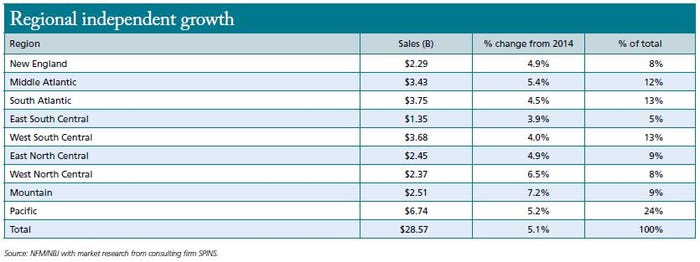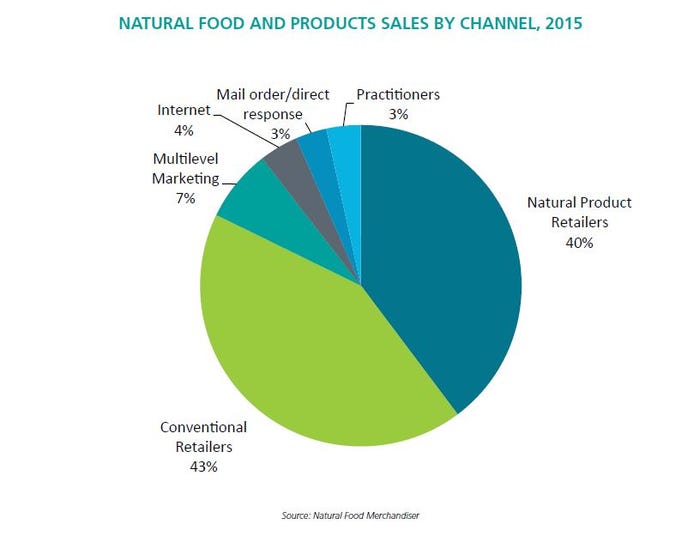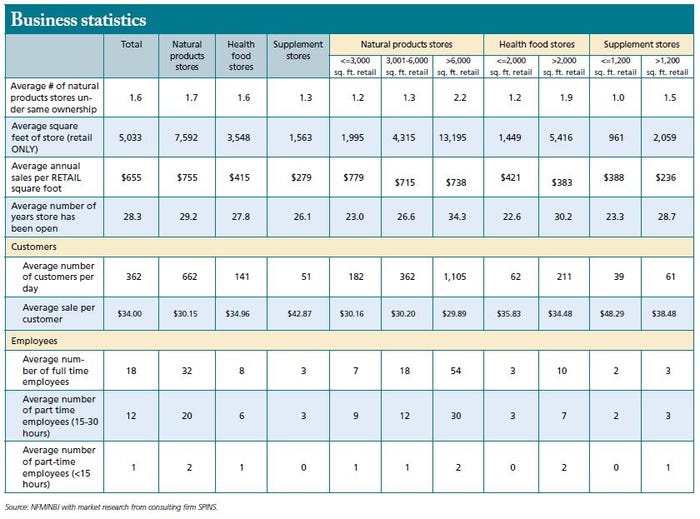
We may be a nation divided, blue state vs. red state, city vs. country, but are we nutritionally divided as well?
It would seem so.
In Colorado, blue in the November election and the leanest state in the nation, there are 21 Whole Foods Markets, roughly one for every 170,000 residents, three in ultra-healthy Boulder alone. In Mississippi, dark red and the second fattest state, with a population of 3 million and the highest rate of diabetes in the country, there is just one. Some of the starkest food deserts in the country sprawl across rural areas and, in Mississippi, fewer than half of the residents live in cities. In Colorado, urban dwellers make up 86 percent of the population.
Red vs blue. Country vs city. Lean vs fat.
Is the nutrition industry ignoring an opportunity or a responsibility? Is there room for a Whole Foods in Biloxi? There’s certainly a need.
Louisville, Kentucky, does have a Whole Foods. For some, that might be a sign of progress. For Summer Auerbach, it’s a sign of competition, healthy competition perhaps. Auerbach is a second-generation owner at Rainbow Blossom Natural Foods Markets. She oversees five locations, four in Louisville and a fifth across the Ohio River in New Albany, Indiana. She knows she lives in “a blue bubble in a red state”; Hillary Clinton beat Donald Trump by 14 points in Louisville. But she knows that bubble doesn’t stretch far beyond the city limits. Her clientele has a higher income and a higher level of education. Outside the city, where the urban gives way to farmland and “farm fresh” is more than a marketing term, the locals aren’t always eating local or healthy at all. “They’re growing this amazing produce that they sell to us and then go buy their chicken at Walmart and are still eating canned green beans,” says Auerbach. She describes a woman she met who does her own canning and lives simply, but adds “I’ve been to their farm before and they are making chicken nuggets.”

Old wisdom, bad habits
Beyond the outer fringes of the Louisville bubble, deep in Kentucky’s red counties, is the town of Winchester, population 18,383. Across the street from a Kroger supermarket, Laura Sheehan’s Full Circle Market stocks organic produce, bulk herbs and supplements, the staples of the natural channel, and draws what she describes as a community clientele. She knows them, by name. And they know her. “They know they can come in and find those thing they can’t find anywhere around here,” Sheehan says. Many of them come in from the country with a kind of country wisdom that might resonate as both charming and healthful to bubble dwellers who seek out the old remedies—old, but also personal and immediate in rural America. Sheehan says a customer might come in for peppermint leaves to make tea and she will know “they didn’t read about that online. It was what their grandmother did if they had a sore tummy when they were a kid.”
Sheehan recalls a woman who came in recently with a special order for two pounds of dried elderberry. “She wanted two pounds of it to make elderberry syrup to give her family for Christmas,” Sheehan says. “That’s not something she found on Pinterest.”
But there is another side of the country life that has little to do with old remedies and recipes passed down through the generations. The problem, it appears, is that too many of the old ways are abandoned at the nearest drive through—fast food is curiously ubiquitous in parts of the country where the produce is as fresh as the closest field.
And not all of the old ways are healthful. One study of attitudes toward healthy food among Appalachian residents found that “culturally appropriate” foods heavy on the meat and fat could be tied to health problems. In some of the counties studied, more than 70 percent of adults were overweight or obese.
Incomes are low. Participants in the study remarked that “healthy food” is more expensive. There’s a reason the Kroger across the street from Sheehan’s store has a bigger parking lot.
Local knowledge
Less processed foods, organic and fresh, are the obvious foundation to good health. It’s mission one at many of the natural grocers that dot the rural expanses in numbers that might be surprising to people who dismiss the flyover country as the land of Hardee’s and Velveeta. But in many cases, supplements, with their higher margins, are the foundation for the economic health of those stores.
The depth of knowledge and acceptance of good nutrition in the more remote spaces might be surprising to people on the coasts. Christine Klement runs the Good Health Market in Sheridan, Wyoming, near the northern border of the most sparsely populated of the contiguous states. “We’re probably more rural than most of rural America,” she says, with a hint of pride. “We’ve got to drive 130 miles to get to the nearest mall.”
In northern Wyoming, People eat “local” almost out of necessity, Klement says. It’s grass fed beef and pasture-raised pork. She believes the area residents can feel a connection to the land that might manifest in their interest in natural solutions. People who work in nature see how nature works. “You think of ranchers sticking to traditional things,” Klement says, equating “traditional” to conventional medicine, “but actually some of our ranchers are the most willing to try something new.” City people may read about the power of natural nutrition. Ranchers see it in front of them. “When they look at their animals, and animals have a sense of when to eat wormwood, they relate to nature in a very pure sense,” Klement says.
And, of course, they can find nutrition tips on the internet.

Boon and bane
The internet means the same challenge it means for any retailer, urban or rural. People might learn about an herb or essential nutrient in a store, and then find it cheaper online. What they won’t find online is the close personal connection that rural retailers enjoy with their customers. Jill Johnson grew up in Sunshine Health Foods, the third generation in the 48 years the store has been open in Cedar City, UT. She doesn’t need a loyalty card program to know her customer base. “We probably know 85 percent of our customers by name,” Johnson says.
That connection matters. The internet may poach customers from retailers coast to coast, but there is power in customer loyalty. “People who’ve left the community still have us ship product to them.”
The internet can work in both directions too. Sheehan says some of her customers found Central Market online. That’s a point of contact. The store’s website features photos and bios for everybody who works in the store. Sandra Folsom is the “essential oil guru.” Katie Wallace is a “foodie extraordinaire.” “When you come in, one of those people is here to help you,” Sheehan says.
One rural retailer called the internet the “the great equalizer.” Many customers come in asking for something they learned about online and bring questions for the staff. Klement says her customers still depend on her for the final word on which supplement to buy. “We kind of maybe guide a little bit,” she says.
Small town sensibilities
Not all the lessons of rural retail are easily transferred from coast to country, but for supplement companies there is still much to learn from the heartland. Andrew Pittz grew up on an Iowa farm and could be called an activist farmer in his mission to promote aronia berries, high in antioxidants and sourced from dozens of farms in his native Iowa. Pittz, who has stood in the aisles across the Midwest demoing his ingredient, believes that “transparency” is more than a marketing term in the farm belt.
“Transparency is important on the coasts, but I think it’s essential in the center of the country. It’s the only way to be successful in the Midwest,” Pittz says.
It certainly made it easier for Pittz to introduce the berry to new consumers. He had a story of growing up on a farm and could talk about the farms where the berries are grown. That kind of connection could have more resonance in his home state than just about anywhere. “If you know the farmer who grew the greens that have gone into a supplement, you basically know the supplement,” Pittz says.
Smart retailers are using that to bring customers in, staging farmers markets in their parking lots and introducing their customers to the faces along the supply chain. “Health is a natural component of that,” he says, and the journey from healthy whole foods to supplements is not a long one.
Some stores are better than others at helping shoppers along on that journey. Pittz admires the employee owned Hy-Vee grocery chain for its nutrition outreach. Bigger chains are attempting the store-within-a-store concept, but Pittz says Hy-Vee is setting the standard. Brookings, North Dakota has a population of 22,000, but they also have a dietitian in the Hy-Vee, “Mondays through Fridays and some Saturdays.” The chain has gas stations but they also have wellness centers. “I think that there’s a sort of a movement towards that,” Pittz says, “but I don’t know of any other mass market grocery store chain in the country that has a dietician in every store.”

Healthy relationships
Rural retailers do have their complaints about the supplement companies. Some feel ignored. “Are they paying attention to us?” Johnson asks. “Are they listening? It doesn’t feel like it.” They see fewer reps than they used to and miss the days when in-store education was more common.
But they also have suggestions. Access to healthcare can be limited in the country, and, internet or not, the language of nutrition needs to be simple. “In the city they might say they have diabetes,” Sheehan says. “Here, they come in here and say ‘I’ve got the sugar.’” Rural customers like products with the supported conditions easy to see on the label. “They want things that are symptom specific, for achy back, or dry eyes. They don’t say ‘I have sciatica.’”
Every retailer interviewed for this story also said their customers want to see labels simplified and straightforward with ingredients they know. Trust is built into the smaller communities in a different way and the consumers there want to know where the companies making the products stand. “They want to see a clean label, where they can read the ingredients, or they have enough trust in the company that they are sourcing the right stuff with clean things,” Klement says.
That desire for a simple label can carry over to formulas as well. Sheehan says her customers are more likely to prefer one-ingredient products than formulations. Full Circle Market might stock a vision formula with lutein and blueberry, but many of her customers “would rather just buy the blueberry powder or the blueberry capsules.”
Then there are the undeniable economics. The rural economies are often stagnant. Jobs may be few. Money is tight. Price matters. Auerbach puts it simply: “They are looking for quality products that deliver results.”
All of these dynamics of price, quality, education and need, place a responsibility on the supplement industry that not every company is going to be eager to meet. The fundamentals of business include “go where the money is,” but if supplements are a kind of healthcare, as many would argue, there is a duty go where the need is as well.
The markets where the need could be greatest, in the red states of flyover country, could be the markets where the nutrition industry, both supplements and food, are not breaking through the cultural and economic barriers to deliver better health.
Good health doesn’t need to be the privilege of the affluent, and good health means more than tubs of muscle-boosting protein powder. There are 12 GNCs in Mississippi.
They could use a few more Whole Foods.
From Nutrition Business Journal's 2016 Retail issue. For the full issue, including extensive market data and state of the industry analysis, call subscription services at 303-998-9536.
About the Author
You May Also Like






